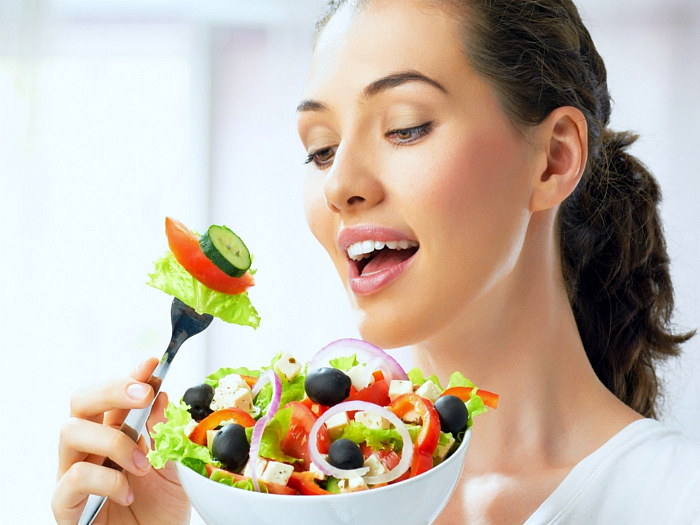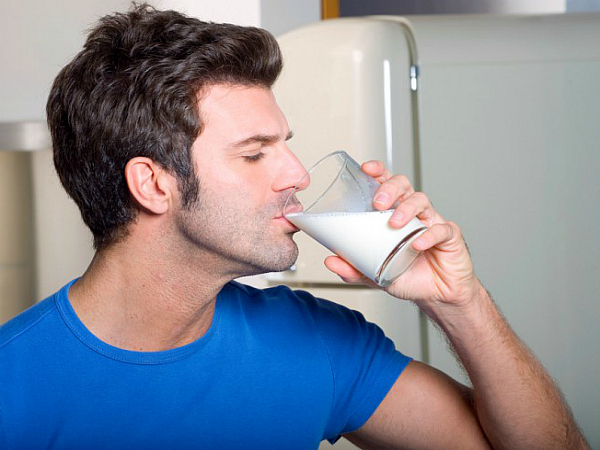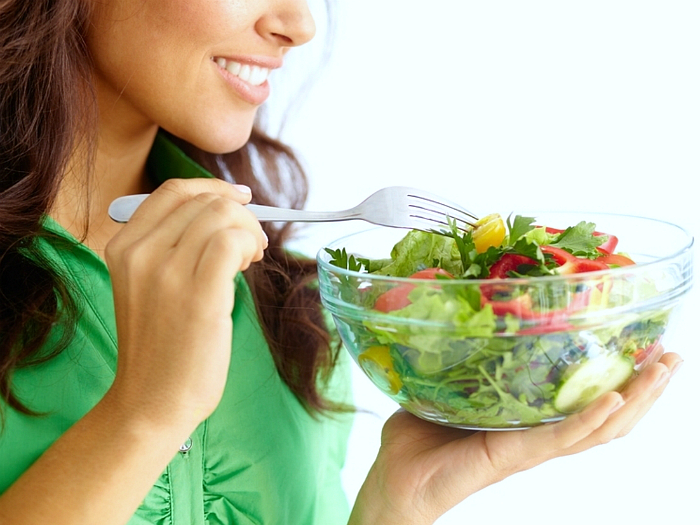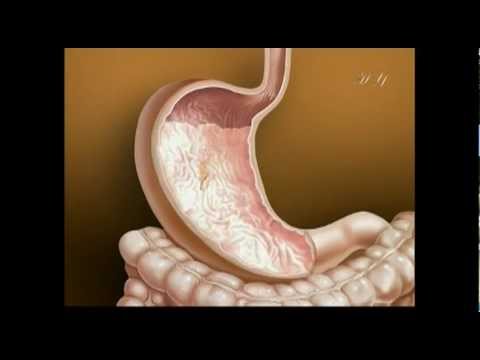Occurs in the stomach important processes mechanical and chemical processing of food and its preparation for further digestion in the intestine. Due to its shape in the form of a bag, the stomach contributes to the accumulation of food masses and their delay for some time. This is necessary for a more complete processing of food. But not all foods are digested and absorbed at the same rate. Depending on the type of food is in the stomach from a few minutes to several hours.
Digestion in the stomach in children and adults
The human stomach is able to digest most of the products that enter it. Food processing occurs due to the production of two main components by the gastric glands - pepsin and hydrochloric acid. They come into contact with the food that has entered the stomach and turn it into chyme - a homogeneous mushy mass, which is then evacuated through the pyloric sphincter into the duodenum.
The process lasts from half an hour to several hours, depending on the type of food eaten. This is what happens in adults. In infants, the stomach is poorly developed, has a small volume and is able to digest only breast or cow's milk. Digestion in the stomach of a newborn child lasts no more than three hours, which explains the need for frequent feeding.

Heaviness in the stomach
Heaviness in the stomach and bloating after eating - possible reasons and methods of treatmentProduct types
The quality composition of the products affects the time of digestion of food in the stomach. Based on this, 4 types of dishes can be distinguished:
- 1. Food processed by gastric juice for more than 3 hours.
- 2. Dishes that take 2 to 3 hours to digest.
- 3. Products that are in the stomach from 1.5 to 2 hours.
- 4. Food that does not require more than an hour to digest.
The first type includes almost all canned food, dumplings, meat, poultry, coffee and tea with milk, as well as pasta made from first grade flour. The second category of dishes includes bread and other pastries, hard cheeses, cereals, legumes, cottage cheese, all kinds of mushrooms, seeds and nuts. The third type is different types vegetables, dried fruits, herbs, dairy products (except for hard cheeses and cottage cheese). The fourth group includes vegetable and fruit juices, kefir, berries, fresh fruits (except banana), chicken egg.

Digestion time of individual foods in the stomach:
| Products | Digestion time |
| Water | Goes directly into the intestines |
| vegetable broth | Up to 20 minutes |
| vegetable juice | Up to 20 minutes |
| Fruit juice | Up to 20 minutes |
| Fresh vegetables and vegetable salads without dressing | Up to 40 minutes |
| Berries and fruits containing a lot of water | 20 minutes |
| Pears, apples, peaches | 30 minutes |
| Boiled vegetables | Up to 40 minutes |
| Corn, zucchini, all types of cabbage | Up to 45 minutes |
| Most root vegetables (except those containing starch) | 50 minutes |
| Fresh vegetable salads with vegetable oil | Up to 1 hour |
| Egg | 45 minutes |
| Fish | Up to 1 hour |
| Vegetables containing starch | 1.5 to 2 hours |
| Cereal porridge (buckwheat, millet, rice and others) | Up to 2 hours |
| Dairy products (milk, kefir, yogurt, fermented baked milk), except for hard cheeses and cottage cheese | up to 2 hours |
| Legumes | up to 2 hours |
| poultry meat | 2.5 to 3 hours |
| Various types of seeds | 3 hours |
| nuts | 3 hours |
| Beef and lamb | 4 hours |
| Pork | 5.5 to 6 hours |

Gas formation
Digestion of individual foods in the stomach
Although many products can be grouped in terms of processing time into individual groups, within the groups themselves there are also differences in the terms of their stay in the body.


Anatomy
Water
Drinking water does not carry an energy load, therefore it does not require digestion and a long stay in the stomach. Drinking on an empty stomach, it immediately enters the small intestine.
Fresh fruits
The rate of processing of fruits in the stomach directly depends on the content of carbohydrates and water in them:
- Grapes and citrus fruits are digested in the stomach for about 30 minutes.
- A ripe banana will take 50 minutes to process, while a green one will take about an hour.
- It also takes about an hour to split the pineapple pulp.
- The most difficult fruit to digest is mango, which takes about 2 hours.

Dairy
The rate of digestion of dairy products is affected by their fat content, the method of preparation and storage:
- Faster than all products, the stomach will leave kefir (up to 90 minutes).
- Curdled milk, yogurt and fermented baked milk will take up to 2 hours
- Fat-free cottage cheese will be digested for about 2 hours, and for splitting more fatty product will take up to 3 hours.

Cereals and legumes
Various types of cereals pass through the stomach in 2-3 hours. Legumes, although they are vegetable crops, require quite a lot of time to digest, as they contain a large amount of protein in their composition:
- Oatmeal is the fastest to digest (up to 90 minutes). But whole grains can take up to 2 hours to process.
- Buckwheat, millet, rice groats need about 2 hours.
- The stomach will cope with corn in 150 minutes.
- Fresh peas are in the stomach for up to 160 minutes.
- Boiled peas require about 3.5 hours to digest.
- The organ will spend 3 hours on lentils and beans.
Bread
The rate of digestion of bread depends on the grain from which it is made, as well as the ingredients added during the cooking process. Rye or wheat bread usually stays in the stomach for 2 to 3 hours.

Hard cheeses
The digestion time of hard cheeses depends on their fat content. Low-fat varieties can take up to 3 hours to process. Fatty cheese made from whole milk will stay in the stomach for up to 5 hours.
Meat and meat products
Digestion of meat depends on many quality characteristics (fat content, freshness, etc.):
- Pork tenderloin leaves the stomach after 210 minutes of processing. Fatter parts require much more time.
- The body needs to spend about 3 hours on lamb and beef.
- The heaviest product is lard, which can take up to a whole day to digest.
![]()
poultry meat
It takes about 90 minutes for the stomach to process chicken breast. More fatty parts will take more than 2 hours. Turkey also takes a little over 2 hours to digest. Duck and goose, due to the fat content of meat, can be in the stomach for about 3 hours.
Vegetables
The speed of digestion of vegetables mainly depends on the content of starch and fiber in them. And the more of them - the longer the process of digestion will continue.

Fish and seafood
Low-fat fish species (hake, pollock, cod) are processed by the stomach for about half an hour. More fatty varieties (salmon, pink salmon, trout, herring) require up to 80 minutes of processing. It takes 2 to 3 hours to digest shrimp and sea cocktails.
Factors affecting the rate of digestion of food in the stomach
The speed of digestion is influenced by many factors related to the condition digestive system and methods of food preparation. Even the way food is eaten significantly affects its further processing and movement through the gastrointestinal tract.
It is known that the reduced acidity of gastric juice significantly reduces the rate of digestion of products. This effect can be observed in people with hypoacid gastritis, who are forced to take drugs that increase acidity and speed up digestion.
Chopped foods will be exposed to the action of gastric juice much faster. Therefore, thoroughly chewed or chopped food in a blender will speed up digestion. The consumption of a large amount of liquid during meals leads to dilution of gastric juice, a decrease in acidity and a delay in food masses. The speed of digestion is also affected by the time of consumption of food. Digestion will be faster in the morning and afternoon.

The way food is prepared and served plays a big role. important role in the speed of its processing. Thermally processed food is digested more slowly than raw (boiled vegetables are processed by the stomach more slowly than fresh ones). Usually dishes contain products from different categories. Ingredients that take a long time to digest slow down the processing of other ingredients. For example, pork served with vegetables will significantly reduce the digestion rate of the latter.
Digestion of food is a rather complex process, depending not only on the qualitative composition of the products, but also on the way they are prepared and consumed, as well as on individual characteristics organism.
And some secrets...
If you have ever tried to cure PANCREATITIS, if so, then you have probably encountered the following difficulties:
- medical treatment prescribed by doctors simply does not work;
- replacement therapy drugs that enter the body from the outside help only for the time of admission;
- SIDE EFFECTS WHEN TAKING PILLS;
Now answer the question: Are you satisfied with this? That's right - it's time to end this! Do you agree? Do not waste money on useless treatment and do not waste time? That is why we decided to publish THIS LINK to the blog of one of our readers, where she describes in detail how she cured pancreatitis without pills, because it has been scientifically proven that pills cannot cure it. Here's the proven way...
Diet plays an important role in maintaining proper health. healthy eating, helps in the prevention of obesity, as well as gastrointestinal diseases.
There are several types of foods such as fruits, vegetables, grains, fish, etc. that can be easily digested in the body. As a rule, these products are indicated for people who suffer from digestive disorders or have recently undergone surgery. However, it is wise to include these foods in your diet to prevent illnesses such as constipation, irritable bowel syndrome (IBS), etc.
Easily digestible fruits
Fruits and vegetables are the most light products for digestion. They contain fiber which helps in speeding up the digestion process in the body. Therefore, fruits and vegetables are first on the list of easily digestible foods.
Apples
Avocado
Banana
Blueberry
figs
Pears
plums
Papaya
Strawberry
Watermelon
Fresh juices
Vegetables that have undergone thorough cooking are easier to digest than raw vegetables (for example, in salads). It should also be noted that the presence of a large amount of legumes, beans and lentils can lead to digestive problems and, therefore, it is advisable to limit their consumption.
Beans (black, Lima)
Carrot
Kale
Lentils
Peas
Potato
Sweet potato
Several sources of carbohydrates can be easily absorbed by the body, and fermented foods can be beneficial for digestion. However, it makes sense to consult a nutritionist about the effects of food fermentation. In addition to the above, here are a few more products that could be included in the list.
Whole grains
Boiled rice (white, brown)
rice pasta
Rice cakes and crackers
Quinoa
Millet
wheat bran
oats
Toast
Soup
Fish
chicken fillet
Porridge
Yogurt
Among these foods, rice in any form, properly cooked. It is prescribed for people suffering from illness, children, the elderly, etc. Chicken and fish, when cooked, also digest faster than when consumed in other forms.
On the other hand, if you want to know which foods take longer to digest, then look at nuts, seeds, soy products, cabbage, wheat, rye, milk and dairy products, etc. Consuming these foods in in large numbers every day can lead to constipation. At the same time, consumption of curry, spicy food, tea, coffee, etc. can also cause digestive problems, and therefore should be limited.
In addition to changing your diet, you also need to make changes to your lifestyle. It is recommended to have small frequent appointments food, 4-5/day. Secondly, you should not lie down or sleep immediately after eating, as this can disrupt the digestion process. It is better to eat 1-2 hours before rest or any physical activity.
Food compatibility is very important, because nothing has such a strong effect on our health or ill health as the right or wrong combination of products.
Sometimes after eating we have a desire to sleep. This is because digestion requires a huge expenditure of energy from all body functions. The work of the heart, lungs, nerves, brain, endocrine glands, all organs and systems constantly requires a certain amount energy. Digestion takes more energy from the body than all its functions and any exercise stress(running, cycling, etc.).
Where can the body get additional energy from? Obviously there are only two ways.
- Eat easily digestible food, on which the body spends the least of its energy and time to digest, assimilate and purify.
- The right combination of products.
What can we call easily digestible food?
This good quality sunlight, air, water, plant products, rich not only in light, water, oxygen, but also in fiber, vitamins, trace elements, amino acids, fatty acids, alkaline bases.
Fruit, when eaten properly (fresh, raw, separate from other foods, on an empty stomach, before meals) is usually digested within 30-80 minutes. Vegetables, consumed separately or in the right combination, are digested in 2 hours. At the same time, our body is adapted to their assimilation both physiologically and genetically. But as for the combination of vegetables with other products, it is necessary to know certain laws in order not to suffer later from indigestion, gas formation, discomfort, which can lead to chronic diseases. What are these laws?
Fruits and vegetables are digested in the small intestine, leaving the stomach very quickly. Bread and meat, on the contrary, must first be processed by the juices of the stomach. When you eat meat, bread and fruits at the same time, fermentation begins in the stomach with the formation of alcohol, acetic acid and other unwanted products. It turns out that it is not the products that are harmful in themselves, but their wrong combinations are harmful.
Incompatible products, while entering the stomach, disrupt the natural process of digestion, become poisonous.
It has long been known: The following mixtures are poorly combined with each other: fish and milk - two proteins cannot be used at the same time; milk and fruits - fruits do not go well with anything; eggs and fish - two proteins - overload; peas and sugar - protein and carbohydrates do not combine; chicken and sour milk - two proteins are not digested; honey and oil - fat and carbohydrates.
The basis of every meal should be fresh green vegetables; and most of them (if not all) should be raw.
Salads do not need to add a lot of oil and acid: excess acid interferes with the absorption of starch and proteins, and oil significantly reduces the release of hydrochloric acid in the stomach.
The juices of cabbage and other vegetables stimulate the secretion of gastric juices and enzymes, which is why it is so good to eat meat or fish with green vegetables.
Fruits eaten simultaneously with ordinary food can turn into a rotting mass in the stomach and intestines: therefore, it is better to eat them separately - after all, the body needs only 40-60 minutes to digest fruits. Eat fruit, wait an hour, then sit down to dinner. Try not to mix sour and sweet fruits.
An alkaline diet is healthy for your body, so be sure to eat raw vegetables and raw fruits.
Those who love fresh vegetable and fruit juices, fresh vegetable salads and fresh fruit salads will keep their health for years to come.
What is the right way to combine food? Food compatibility. Principle of food compatibility
In 1902, the great physiologist I. P. Pavlov published the work "The work of the digestive glands." He found that for each product the body produces its own enzymes and juices (“bread juices”, “meat juices”, etc.). This work gave impetus to scientific thought in formulating the basic rules for combining foods on a physiological and biochemical basis.
Numerous deep Scientific research devoted to the combination of foodstuffs were carried out by many scientists of the world. Interesting studies were conducted by the world famous Dr. Herbert M. Shelton. His labors created the science of nutrition, which he called "Orthotrophy", where he clearly formulated the basic rules for combining food products (food compatibility):
- Never eat a concentrated protein and a concentrated carbohydrate at the same time. This means: do not eat nuts, meat, eggs, cheese and other protein foods along with bread, cereals, potatoes, cakes, sweet fruits. In one meal, you need to eat eggs, in another - fish, in the third - milk, in the fourth - cheese, and in a completely different time - bread or cereals, or noodles. If you cannot refuse flour products, then eat them separately.
- Never eat carbohydrate and acid foods at the same time. This means do not eat bread, potatoes, peas, beans, bananas, dates and other carbohydrate foods with lemon, orange, grapefruit, pineapple, cranberries, tomatoes and other acidic foods.
- Never eat two concentrated proteins in one meal. two squirrels different kind and different composition require different digestive juices and their different concentrations. These juices are released into the stomach at different times. Therefore, you must always follow the rule: one protein at a time.
- Never eat fats with proteins. Cream, butter, sour cream, vegetable oil should not be eaten with meat, eggs, cheese, nuts and other proteins. Fat suppresses the action of the gastric glands and inhibits the secretion of gastric juices.
- Do not eat sour fruits with proteins. Oranges, lemons, tomatoes, pineapples, cherries, sour plums, sour apples should not be eaten with cheese, nuts, eggs, meat. The less complex food mixtures, the simpler our meals, the more efficient our digestion.
- Don't eat starches and sugar at the same time. Jelly, jams, fruit butter, molasses sugar, syrups should not be eaten with bread or at the same time with cereals or pastries - cakes, cakes, buns. All this will cause fermentation in the intestines, and then poisoning of the body. Usually holidays with cakes, sweets, pastries lead to vomiting, illness, especially in children and the elderly.
- Eat only one concentrated starch per meal. If two types of starch (potatoes or porridge with bread) are consumed at one time, then one of them goes for absorption, and the other remains intact in the stomach, like a load, does not pass into the intestines, delays the absorption of other foods, causes fermentation, an increase in gastric acidity. juice, belching, etc.
- Melon should always be eaten separately and, like any fruit, on an empty stomach, 1 hour 20 minutes before meals.
- It is better to turn milk into a fermented milk product, take it separately or not take it at all. Milk fat prevents the secretion of gastric juice for some time. Milk does not settle in the stomach, but in the duodenum, so the stomach does not react to the presence of milk with secretion, which prevents the absorption of other food if it came with milk or dairy products. One of the main tasks of the right combination of products is to prevent fermentation and decomposition of food in the intestines.
- In salads, according to G. Shelton, neither vegetable oils nor acids should be added. Acids interfere with the absorption of starch and proteins. If non-emulsion fats are added to food, the secretion of hydrochloric acid in the stomach becomes weak or completely absent. Fats also interfere with the absorption of proteins. It is better to season salads, if necessary, with vegetable juices. The juice of cabbage and other vegetables, added to food, greatly increases the secretion of gastric juice. In addition, juices significantly increase the content of enzymes.
- Fats are the hardest to digest in the body. Fat, even in small amounts, slows down the secretion of gastric juice. Cabbage juice almost completely opposes the inhibitory effect of fats on the secretion of gastric juice and gastric mobility.
- Fruit eaten along with any other food, despite their high nutritional value, will turn all food into a rotting mass. In combination with other products, fruits ferment easily. It is best to eat them separately, before meals, with sour and sour-sweet in one meal, and sweet in another. For their assimilation, fruits require 65-80 minutes. If you eat them with food that takes several hours to digest, the digestive process will be seriously disturbed.
Raw food diet and adherence to 24-36-hour weekly fasts - The best way treatment and prevention of any disease.









